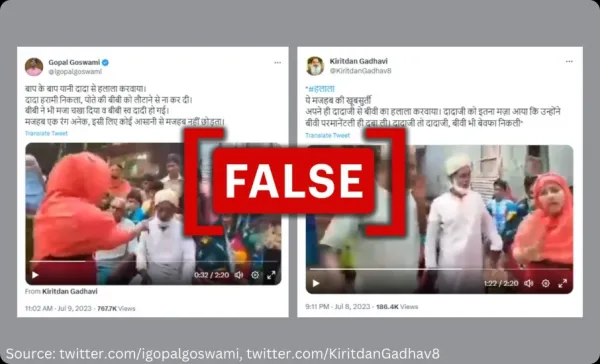By: Rahul Adhikari
July 14 2023

A YouTube channel that produces scripted content originally shared the video with a disclaimer that it is for entertainment.
Context
A video has been doing the rounds on social media claiming that an elderly Muslim man married his grandson's wife for 'Nikah Halala'—an Islamic practice in which a divorced woman marries another man, divorces him, to remarry her former husband. Twitter user Gopal Goswami(@igopalgoswami) shared the video with an Islamophobic caption and claimed that it shows a "faithless" grandfather marrying his grandson's wife for the purpose of 'Halala' and then refusing to divorce her. His post had gained over 770,000 views and over 10,000 likes at the time of publishing. Another Twitter user also shared the video with a similar claim and raked in over 2,700 retweets. An archived version of the viral video can be found here.
The viral video shows a young man purportedly quarreling with an older man over a woman and the status of his marriage with her. The older man says he married the woman and will stay married. A man from the crowd watching the spat states that the older man and the woman were legally husband and wife according to Islamic law. The latter walk away together towards the end of the video.
While the video is being shared as if it captures a real incident, Logically Facts found that it is scripted and circulating with a false claim.
In Fact
We ran a reverse image search on the video's keyframes and came across an extended version published on YouTube by user Sharmin Shakil(@SharminShakil1). The original video is over nine minutes long and carries a disclaimer in the description, saying the purpose of the video is entertainment. Translated to English from Bengali, part of the description read: "Hey guys, how are you? Our stories are taken from real life. We are not responsible if they resemble someone's life. Everyone will watch the videos as entertainment. Here is today's entertainment for you. Keep watching the entertainment and if you like the video, please like, comment, and share. Thanks."
We combed through the YouTube channel's content and found many scripted videos with disclaimers mentioning that they were only for entertainment. Upon reviewing the YouTube channel's library, we found that there are over a hundred videos of similar nature. Most of these scripted videos revolve around conflicts within family and married life. Some of the videos specifically focus on extramarital affairs. Many of the channel videos, including the one in question, mention Bangladesh as the location.
The 'grandson' in the viral video has also appeared in several other scripted videos posted on the channel. The 'grandson' portrayed the role of a teacher in a different video. We also found that one woman who appeared in the viral video, wearing a red scarf, assayed the role of a housewife in a different video.
Visuals between the 7:10- 9:30 timestamp from the original YouTube video have been extracted and shared on social media without the disclaimer. The storyline of the original video revolves around a grandfather marrying his grandson's wife for the purpose of performing the 'Nikah Halala' ritual. However, the video is not of an actual incident and appears to have actors performing scripted roles as part of a story.
Several YouTube channels from India and Bangladesh produce such scripted videos, often accompanied by sensationalized captions to grab eyeballs. Logically Facts has previously debunked claims wherein scripted videos were falsely shared with a communal spin.
The Verdict
The video of a Muslim man marrying his grandson's wife and then refusing to leave her is scripted. The YouTube channel that seems to have originally shared the video produces scripted content for entertainment purposes. Therefore, we mark the claim false.